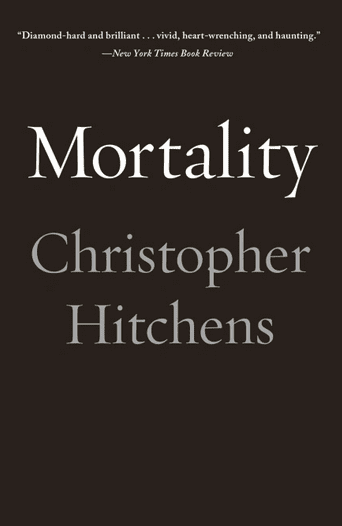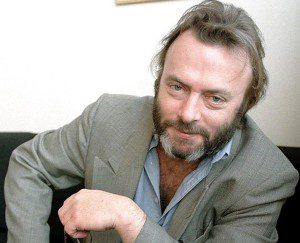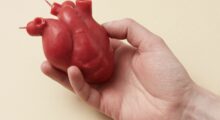 It may be ironic that the first book I’ve read by Christopher Hitchens is his last: “Mortality,” a short memoir of his fatal encounter with esophageal cancer. Beginning with his diagnosis and ending, abruptly, with some unfinished jottings (followed by an afterward from his wife, Carol Blue), “Mortality” offers a touching look at one man’s struggle with illness and the approach of death.
It may be ironic that the first book I’ve read by Christopher Hitchens is his last: “Mortality,” a short memoir of his fatal encounter with esophageal cancer. Beginning with his diagnosis and ending, abruptly, with some unfinished jottings (followed by an afterward from his wife, Carol Blue), “Mortality” offers a touching look at one man’s struggle with illness and the approach of death.
Hitchens is not just any man. As a long-professed anti-theist, public intellectual, and best-selling author of “God is Not Great: How Religion Poisons Everything,” he dismissed both the assertions of others that he’d convert on his deathbed and the well-intentioned promises to pray on his behalf. As he wrote:
Of the astonishing and flattering number of people who wrote to me when I fell so ill, very few failed to say one of two things. Either they assured me that they wouldn’t offend me by offering prayers or they tenderly insisted that they would pray anyway. Devotional websites consecrated special space to the question.
“Mortality” Offers Calm Look at Death

Credit: christopherhitchens.net
As someone whose view of Hitchens as an angry, combative figure has been absorbed through second- and third-hand sources, “Mortality” was unexpectedly calm, honest and revelatory. The only angry words were those from Hitchens’ detractors, including such virulent assertions as: “Who else feels Christopher Hitchens getting terminal throat cancer [sic] was God’s revenge for him using his voice to blaspheme him?” Instead, Hitchens described the horrors and indignities of cancer in humorous, even poetic terms — stating, for example, that the experience of chemotherapy leaves one “swamped with passivity and impotent: dissolving in powerlessness like a sugar lump in water.”
Individuals undergoing chemotherapy or dealing with Stage 4 cancer may take heart from Hitchens’ honesty about the daily issues, desires, and challenges involved. He described grasping for hope at cutting-edge treatments, such as a new “immunotherapy protocol” for which he did not qualify. He noted the exhaustion that came from insensitive conversations and the small, daily sufferings such as mouth ulcers or peripheral neuropathy. He acknowledged the enticement of his day’s “real event” — the arrival of his painkiller.
Hitchens was provocative. He was comfortable in his own skin. And even as he assured us that he had no use for religion, there was something about his ongoing debate with the religious world — whether with theologians and scholars, fans and detractors or his own brother — that has a sense of faith to it: faith in anti-theism, faith in himself. Whatever happened after his death of pneumonia at 62, the author who graced us with “Mortality,” and many other books, has left the world a more interesting, debate-worthy and intellectually challenging place.

 “Mortality” by Christopher Hitchens
“Mortality” by Christopher Hitchens


 National Donate Life Month Reminds Us To Give
National Donate Life Month Reminds Us To Give
 How Dare You Die Now!
How Dare You Die Now!
 Debating Medical Aid in Dying
Debating Medical Aid in Dying














